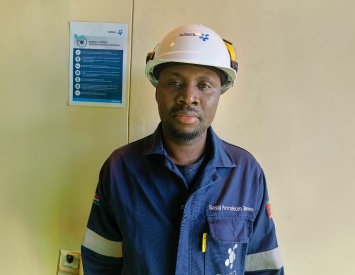Embarking on the journey of continuous education is a testament to a student’s commitment to personal and professional growth.
In this interview, we explore the inspiring academic trajectory of an Instrument Technician, Zito Adelino Fulede, who, motivated by a desire to deepen both practical and theoretical knowledge, completed a 52882WA Advanced Diploma of Electrical and Instrumentation (E&I) Engineering for Oil and Gas Facilities through the Engineering Institute of Technology (EIT).
As Fulede currently pursues a Bachelor of Science (Industrial Automation Engineering) program, we unravel the experiences, motivations, and insights that have shaped this educational journey.
From the initial exploration of online education to the impact of specific courses and subjects, this narrative unveils the driving forces behind the transition from an advanced diploma to a bachelor’s degree.
Hear From a Student & an Instrument Technician
Fulede, from Mozambique, Africa, completed his advanced diploma in 2019 and is currently pursuing his bachelor’s degree with EIT.

What inspired you to pursue a 52882WA Advanced Diploma of Electrical and Instrumentation (E&I) Engineering for Oil and Gas Facilities?
I am currently employed as an Instrument Technician and sought to enhance my knowledge in this field, both in practical applications and theoretical understanding.
How has your experience in the oil and gas sector influenced your decision to pursue a Bachelor of Science (Industrial Automation Engineering)?
Years of experience as an Instrument Technician in the oil and gas industry have provided me with insights into fundamental core subject areas of industrial automation engineering.
This includes process control systems, communication and networks, industrial data communication, programmable logic controllers (PLC), Supervisory Control and Data Acquisition (SCADA), and Distributed Control System (DCS).
Why did you choose EIT?
I recall back in 2016, during my attendance at the Industrial Instrumentation and Control Training in South Africa, I initiated an online search for an institution offering engineering courses ranging from certificates to degree levels.
It was then that I stumbled upon EIT. Upon reading about it, I was pleased to discover that it stood out as the singular, globally well-equipped institution providing engineering courses utilizing the latest technologies.
How do you see the knowledge and skills gained from both programs contributing to your future career in industrial automation?
I am confident and enthusiastic about entering the field of industrial automation, particularly given the outstanding knowledge transfer I encountered both during my advanced diploma studies and my ongoing experience in the bachelor’s program with EIT.
The guidance from industry-experienced and knowledgeable tutors was and still is at its best, equipping me with the necessary skills and insights.
What motivated you to study for a bachelor’s degree after completing your advanced diploma?
After the completion of my advanced diploma, I recognized the possibility of pursuing a bachelor’s degree, inspired by the flexibility and quality of education provided by EIT.
I aimed to advance my studies to elevate my academic standing and enhance my depth of knowledge in the field.
Why did you choose to study online?
As a full-time worker, I discovered that the online courses offered by EIT were not only more suitable but also adaptable to my work schedule and family responsibilities.
Can you highlight any specific courses or subjects that have had a significant impact on your understanding of industrial automation?
The subjects of Programming (BSC 201C), Communication and Networks (BIA206S), and Communication Systems and Protocols (BIA 301S) held immense significance for me.
Prior to my enrolment at EIT, these subject areas were somewhat elusive to me, despite my daily engagement with them in the workplace.
Considering your experience in both fields, do you have a preference for one over the other? Why or why not?
I am inclined towards both instrumentation and automation engineering, as I am currently deeply involved in both realms, and I am thoroughly enjoying this work.
Although I am presently operating as a technician, I aspire to be in a bigger engineering position in the near future.
How do you envision applying your skills and knowledge to contribute to the development of the industrial sector in Mozambique or beyond?
I aim to excel and become a top professional in the industry, dedicating myself to not only reaching my highest potential but also guiding others to recognize the importance of instrumentation and industrial automation in real-world applications.
Acknowledging the ambitious nature of this goal, I am confident that EIT has provided me with the necessary skills and knowledge to navigate any challenges I may face.
How has your experience been studying with EIT?
The live sessions and interactions with peer colleagues during my studies were truly fantastic and excellent.
This experience not only enriched my learning but also allowed me to establish valuable connections with colleagues from around the world, contributing to the development of a strong professional network.
As you finish your studies, what advice do you have for students thinking about studying electrical and/or automation engineering?
Top of Form
Do not hesitate in deciding whether to pursue it or not. Simply register and commence your studies, as the investment will undoubtedly prove worthwhile by the end of any course you choose.
I assure you there will be no regrets. EIT stands as the best online institution committed to delivering excellence.